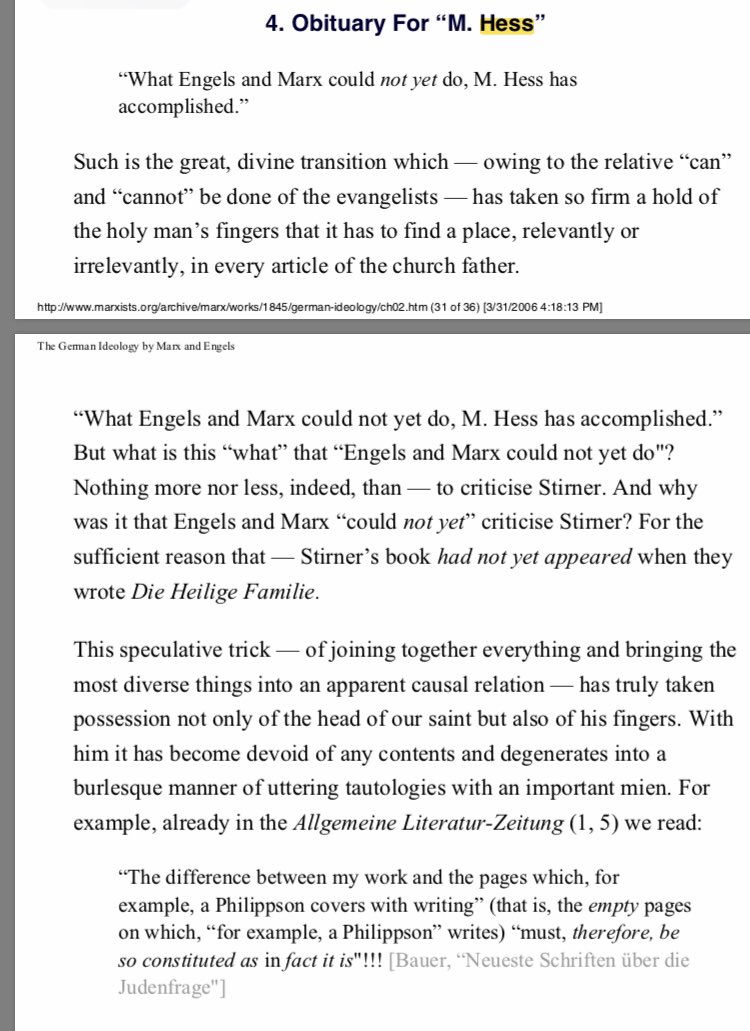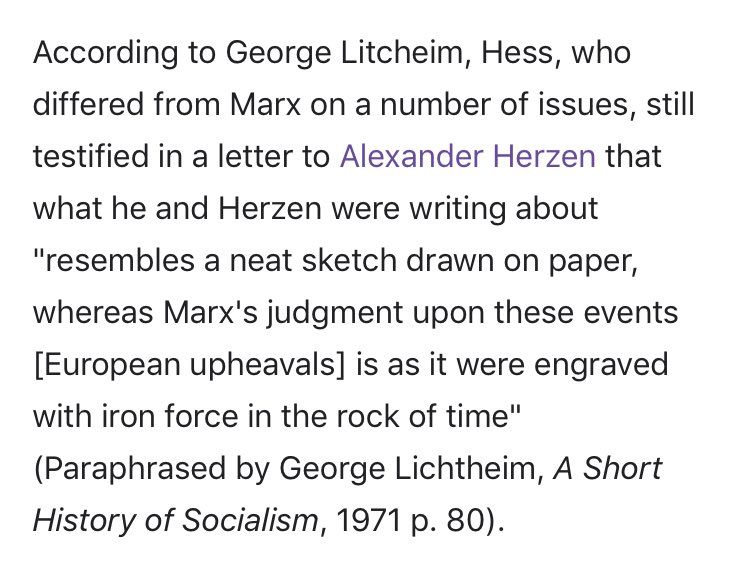Cancelling Karl Marx for ‘On the Jewish Question’, but not for any antisemitism, or historically dated notions of religion, but by using Moses Hess’ definition of Judaism & emancipation, That makes Marx a crypto-Zionist
I’m (hopefully) obviously joking, but the connection really is there, as Hess was his early & longtime friend & interlocutor, & the basis for much of ‘On the Jewish Question’, Marx’s deployment of Feuerbach & materialist theory in reply to fellow Yung Hegelian Bruno Baeur.
Moses Hess is considered by many to be the spiritual forefather of Zionism, altho primarily retroactively as a source of created pre-history. And an early important inspiration for the Zionist movement was Ber Borochov, who was explicitly a Marxist, & drew on Hess & ‘OtJQ’
Hess, although he introduced Engels to the communist circles of his time & was friends with both Marx & Engels, in a relation of mutual influence, they had fallen out by the end of the 40s over Hess’ humanism, Spinozism & utopian socialism.
Hess was a part of the coterie surrounding the Yung Hegelians, but unlike most of them them he mixed Hegelianism & Communism—Which had a profound influence on Marx & Engels both.
Hess, Like Alexander Herzen, Marx & Engels, and Bakunin, was also a perpetual emigre & exile, all over Germany & in Switzerland, Paris, & elsewhere. Like Herzen & Bakunin, he became an exile bc of his participation’s in various failed revolutions of 1848.
In an obituary of Hess, one can find in the Marxists dot org copy of The German Ideology, says he & Herzen lived in practice what Marx said in theory, but conversely, Hess said of himself, Herzen & Marx a complementary & complimentary ( https://abs.twimg.com/emoji/v2/... draggable="false" alt="😏" title="Grinsendes Gesicht" aria-label="Emoji: Grinsendes Gesicht">) statement
https://abs.twimg.com/emoji/v2/... draggable="false" alt="😏" title="Grinsendes Gesicht" aria-label="Emoji: Grinsendes Gesicht">) statement
Herzen was very influential in Russia, whereas his pal Bakunin participated in revolutions everywhere but Russia. Bakunin was more or less a lifelong exilic professional revolutionary & polemicist, not a theorist, and this shows in his works.
But Marx, Engels, Herzen, Hess, Bauer, the Yung Hegelians in general, and so on, all had formal academic and/or professional training of varying degrees, & all tried to make academic, polemical, organizational & revolutionary contributions.
MLs & Marxian hagiographers often rush to his defense against accusations of antisemitism & Jewish self hatred, whereas bad faith critics vastly overstate such beliefs, but the reality is more complex.
Marx’s family was Jewish converts to Christisnity (including a rabbi), and he was raised in an emancipated concerted Jewish social milieu, that he more or less resented. Being of the German professionals & bourgeois, he inherited their ideologies, including antisemitic views.
He also had lifelong Jewish friends & believed in Jewish emancipation. And his views & stereotypes of Jews were shared by many, including other Jews, like Hess to an extent, & are therefore historically rooted.
Many of them had internalized the long held view & stereotype of Jews as commercial, cheap, attached to money, materialistic & either capitalist or protocapitalist, regardless that this image was a myth (see Myth of Jewish Money Lender multiple volumes)
This was the idea that as liminal, excilic, foreign nomadic nation of people, forced into various professions, Jews were overwhelmingly professionals, petty bourgeois, commerce, finance, & non guilded tradesmen—theres a historical fictional but not broad statistical truth to this
Antisemitic views in Europe and elsewhere at the time divided into
1.religious ones (descending from Rome but splitting into Protestant, Catholic & Orthodox),
2. leftwing socialism of fools (Jews as capitalist etc) conceptions, (Cont)
1.religious ones (descending from Rome but splitting into Protestant, Catholic & Orthodox),
2. leftwing socialism of fools (Jews as capitalist etc) conceptions, (Cont)
3. Liberal enlightenment portrayals of Jews as backwards, tribal, & fine as individuals but not as a group
4. Reactionary conceptions of Jews as the exact opposite—forces of modernity & weakening social ties
5. Views of Jews as traitors, exiles, liminal, courted, conspiratorial
4. Reactionary conceptions of Jews as the exact opposite—forces of modernity & weakening social ties
5. Views of Jews as traitors, exiles, liminal, courted, conspiratorial
6. Ethnonational, linguistic & political conceptions of Jews as inherently other by culture or slotting or whatever that are a thorn in the side of the process of nation making among Germans, Italians, Russians whatever.
7. Undue gainers due to emancipation which must have meant undue influence & finally
8. The beginnings of biological & racial concepts, tied to ancestry, inheritance, kinship, geography, culture, language & so on (origin of the word antisemitism in fact)
8. The beginnings of biological & racial concepts, tied to ancestry, inheritance, kinship, geography, culture, language & so on (origin of the word antisemitism in fact)
That these views are often internally self contradictory & asymmetric, and definitely contradictory when held together, did stop their being held. Nor does it matter that 5 or 6 had no empirical truth at all & the rest had truth only by virtue of imposition & past force.
Proudhon & Bakunin, for example, both were also antisemitic in many of the above ways. Marx avoided public antisemitism for fear of being associated with them, or with reactionaries like Catholics, but privately held some views, such as in his infamous Lassalle letter.
Marx, also like those around him at the time, from Engels to Hegel to Hess, believed in & absorbed nascent ideas coming from various sciences & pseudo sciences (philology, biology, eugenics, phrenology) etc. & in European cultural & racial ideas.
While his personal belief in race science, ethnocentrism, phrenology & eugenics was not particularly deep, or long lived for each, they still influenced his private invective, but also later became the source of jokes & mockery by him & others.
Thus, we can see the transition from the era when Marx saw British colonialism in India, capitalism in America, & imperialism & colonialism generally as agents of civilization & modernity, to his end of life study of ethnology & praise of indigenous & stateless People’s.
But it is in the combination of these views—on Judaism, antisemitism, capitalism, the Jewish Question, contemporary sciences, civilization, imperialism, & capital as force of modernity—he resembled those around him.
And these ideas were not only shared many Yung Hegelians, Anarchists, Communists, academics, and many German & other antisemites left & right, but those as diverse (& w much variation) as Hess, Borochov, Luxemburg, Kautsky, Jabotinsky, Trotsky & Herzl.
Of course, how these were glossed depended entirely on the person—along several vectors:
1. Pro/anti emancipation
2. Universalist and or particulsrist
3. Philo-, vs Anti-, semitism, Or neutrality or self hate
4. Religious or secular
5. Right or left
Etc
1. Pro/anti emancipation
2. Universalist and or particulsrist
3. Philo-, vs Anti-, semitism, Or neutrality or self hate
4. Religious or secular
5. Right or left
Etc
Marx was pro emancipation, universalist, internalized antisemitism, but secular & left. Hess was similar but more particularistic, less secular & more philo Semitic. Trotsky was similar to Marx but much more neutral.
Luxemburg was like Trotsky but went in the other direction of ‘using universalism as cudgel’ like one sees later in Genet for example.
Contrast Bakunin, Proudhon, Feuerbach, To name a few, shared their disdain for Judaism, their antisemitism, & their non Jewish heritage. Herzen & Stirner didn’t share their views https://www.theatlantic.com/magazine/archive/2002/12/a-nine-hour-resurrection/376724/
https://www.theatlantic.com/magazine/... href=" https://moscow.sci-hub.tw/2323/e63d7827d96ca2daafc2a943130bb7fc/stepelevich2013.pdf">https://moscow.sci-hub.tw/2323/e63d...
This is why I mentioned Herzl, Borochov, Hess, Jabotinsky, etc & we can add Leon Pinsker, & David Ben Gurion. What’s notable is not how much they differ from the others, but how many background assumptions they shared w European leftists & rightwingers, philo & anti Semite alike
Zionism has many claimed forefathers—Joseph Nasi, Sabbati Zevi, Moses Mendelssohn, Aaron Lapapa, Warder Cresson, Abraham Benisch & Moritz Steinshreider—but as Michael Stanislawski points out, this is more of an invented post hoc lineage than actual history. Even Hess is complex.
In large part, it’s because it’s hard to classify different groups—for example, just anti Judaism & antisemitism are distinct but related (former older & more specific), religious messianists are different than cultural or social ones.
It’s weird to think of now, but the ‘Jewish Question’ had been a central debate of the European intellectual & political world from the Enlightenment until the Nazis. Everyone has thoughts on it.
I want to do a thread on the relations between anti Judaism & antisemitism, and the Jewish Question etc, but since I don’t want to stray too far from the original subject, I will post it later down.

 Read on Twitter
Read on Twitter ) statement" title="In an obituary of Hess, one can find in the Marxists dot org copy of The German Ideology, says he & Herzen lived in practice what Marx said in theory, but conversely, Hess said of himself, Herzen & Marx a complementary & complimentary (https://abs.twimg.com/emoji/v2/... draggable="false" alt="😏" title="Grinsendes Gesicht" aria-label="Emoji: Grinsendes Gesicht">) statement">
) statement" title="In an obituary of Hess, one can find in the Marxists dot org copy of The German Ideology, says he & Herzen lived in practice what Marx said in theory, but conversely, Hess said of himself, Herzen & Marx a complementary & complimentary (https://abs.twimg.com/emoji/v2/... draggable="false" alt="😏" title="Grinsendes Gesicht" aria-label="Emoji: Grinsendes Gesicht">) statement">
 ) statement" title="In an obituary of Hess, one can find in the Marxists dot org copy of The German Ideology, says he & Herzen lived in practice what Marx said in theory, but conversely, Hess said of himself, Herzen & Marx a complementary & complimentary (https://abs.twimg.com/emoji/v2/... draggable="false" alt="😏" title="Grinsendes Gesicht" aria-label="Emoji: Grinsendes Gesicht">) statement">
) statement" title="In an obituary of Hess, one can find in the Marxists dot org copy of The German Ideology, says he & Herzen lived in practice what Marx said in theory, but conversely, Hess said of himself, Herzen & Marx a complementary & complimentary (https://abs.twimg.com/emoji/v2/... draggable="false" alt="😏" title="Grinsendes Gesicht" aria-label="Emoji: Grinsendes Gesicht">) statement">


